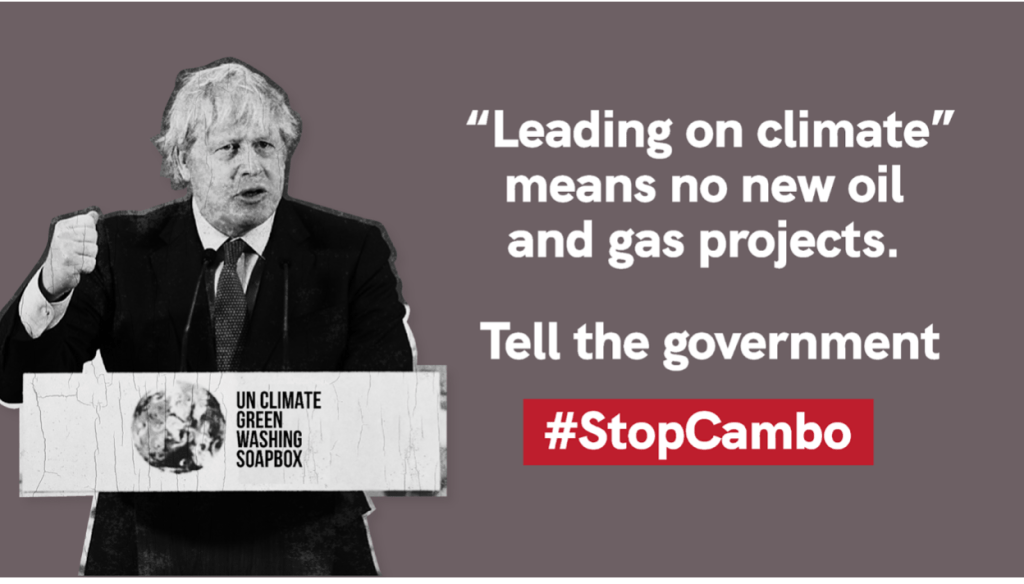Both the UK and Scottish governments remain committed to continuing extraction of North Sea Oil and Gas. Carbon emission from the burning of these fuels are more than five times those of the whole Scottish economy. Yet these emissions are not included in Scottish or UK targets for emissions reduction. The assumption is that other countries will cut usage and the market will then drive down demand or, and more often, that we can carry on producing willy nilly but consumers will find ways of capturing the carbon. Both of these events are deferred into the future and exploration and development of new fields continues. The Sea Change report shows how these plans are incompatible with a zero carbon economy and with a just transition.
Thanks to Friends of the Earth Scotland for these notes on the latest development west of Shetland.
- Oil giant Shell and Siccar Point Energy are seeking permission from the UK Government to develop the Cambo oil field, West of Shetland, just months ahead of COP26. In the first phase, due to start in 2025, the companies expect to extract 150 million barrels of oil – the emissions equivalent of 16 coal-fired power plants running for a year. They anticipate operating the Cambo field, which contains 800 million boe, until 2050, by which time Britain has pledged to be net carbon neutral.
- The Cambo Field is the second largest oil and gas development waiting for approval and once up and running is set to be the fifth largest producer in the North Sea. If approved, Cambo Field will be the first UK project to get the green light since the International Energy Agency Net Zero report calling for no new investment in oil and gas starting this year and the Shell ruling mandating the company to slash carbon emissions 45% by 2030.
- The UK Government is currently expected to give its final approval on the project over the next six to eight weeks. Moving forward with the Cambo Field contradicts the findings of the IEA’s net zero report and is incompatible with limiting warming to the Paris Agreement target of 1.5C.

- The climate impacts of opening the Cambo Oil field would be devastating. In the first phase alone, developers want to extract 150million barrels of oil; the emissions from which are equivalent to running a coal-fired power station for 16 years. The field is expected to operate until 2050 – the point by which your government has committed to reaching net zero emissions. And this is just the beginning. Cambo Field is only one of many oil and gas projects waiting for government approval that have the potential to extract 1.7 billions barrels of oil.
- Approving the Cambo field will be a massive failure of UK climate leadership and threatens to undermine the success of the crucial UN climate talks. In just a few months, the eyes of the world will turn to the UK as the hosts of the UN climate talks in Glasgow. Approving the Cambo field will send a clear message that this government is not serious about climate action and not willing to do its part to phase out support for oil and gas. If the UK keeps extracting oil and gas, how can it expect other countries to do anything different?
- The International Energy Agency has stated that to meet the 1.5°C target in the Paris Agreement, there should be no more new investment in oil, gas, or coal. Further, the recent UK Climate Change Committee assessment clearly laid out that current UK policies are far from delivering the UK’s climate goals. The amount of oil and gas in already operating fields in the UK will exceed our share of emissions in relation to the Paris climate goals. The world cannot afford to open new fossil fuel frontiers. This starts with rejecting the Cambo Field.
- If Boris Johnson is serious about being a climate leader, he must reject Cambo, all new fossil fuel developments and support a just transition for oil and gas workers and impacted communities. It’s time to end the UK government’s support for maximising the economic recovery of oil & gas and commit instead to a rapid and fair energy transition. With the right policy support, the UK could create three jobs in clean energy for every oil & gas job at risk. We need a clear, credible plan to wind down production and deliver a just transition that is driven by oil and gas workers, their unions and affected communities.
- The Cambo Field will bring few jobs, little tax and a potentially huge clean up bill for the public purse. Contracts for construction and installation have been awarded to overseas firms, meaning the bulk of jobs will be outside of the UK. As part of a global oil market 80% of UK crude is currently exported, and so this field would not contribute significantly to UK energy security. Siccar Point Energy, who owns the majority stake in the proposed field, paid no net tax between 2015 and 2019, instead receiving £41mn from the government to cover decommissioning costs. Meanwhile, the complexity of the field and high cost of operating in the West of Shetland makes the project high risk, with similar projects suffering from large cost overruns that have driven producers to bankruptcy.

